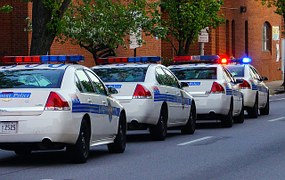When Can the Police Search Me or My Car ?
There are limits on what they police can and cannot do. The Constitution, and, in this instance, the Fourth Amendment, provides an important buffer of protection between citizens, and the power of the State.
We are all guaranteed the right to be secure in our person and effects, and to be free from warrantless or unreasonable searches and seizures.

What may constitute unreasonable conduct, in a constitutional sense, has evolved a lot over the years. The answer to the question posed by this article is not an easy one to give, as it depends on the setting of the search and other attendant circumstances. There are certainly limits on what the police can and cannot do. I’ve said it before in other articles, and it bears repeating. The overwhelming majority of law enforcement officers are decent, hardworking men and women, out there doing the job –and protecting us. But mistakes do happen, and, there are a few select officers or circumstances operating in situations where culminating the violation of someone’s Fourth Amendment rights. As Attorney Eric T. Kirk will tell you.
When that happens, the court may impose a stiff penalty, and preclude the introduction of the wrongly obtained evidence at trial.
So, yes, the police can search you, your car or your house. But they must have justification to do so. Typically, an arrest or search warrant must be obtained, from a judge, who based on a review of all attendant factors, has determined there is “probable cause” to believe a crime has taken place.
The general rule is an easy one to remember. We’ve all seen TV shows where the line “you got a warrant” is used. And that is the general rule. Police cannot arrest you, or search you or your things, without a warrant.
That is, of course, as with all things in the law, unless an exception applies. The exceptions to the warrant requirement are complex and numerous. They are dealt with individually in other chapters in this series.

The law also recognizes that the Constitution is not implicated every time a law enforcement officer and citizen interact. Law enforcement is held to have the same right of inquiry as anyone else, to ask your name, or to approach you and ask questions. It is also held that the recipient of police questioning in these situations, sometimes called field interviews or “consensual encounters” has the right to walk away. While that is language one sees a lot in court opinions, the practicality, or wisdom, or walking away from a police officer who is asking you questions has always seemed somewhat dubious to me. The Fourth Amendment is not implicated unless and until a person has been “seized”. This is typically defined as occurring when someone has had their liberty, or freedom of movement, curtailed in such a way that they would no longer feel free to leave.
The constitution requires that before officers can take this step, they must have a reasonable suspicion to believe that criminal activity is afoot. The person who has been seized, e.g. pulled over in a car, is said to be detained.
Another line that you see a lot in the movies, is “bring him in for questioning”. Well, there is no, or at least should be, no “bring him in for questioning”. Either the police have sufficient evidence to have a judge issue a warrant for your arrest, or they don’t. Sufficient evidence for an arrest is called “probable cause” to believe a crime has been committed- a different, and higher legal standard discussed in more detail in a separate chapter. But a personal can be detained, temporarily, either in a car, or on foot, based on a lesser showing of reasonable suspicion. The detention may only last until the suspicion is dispelled or confirmed.
During this detention, the police may be entitled to conduct a search of the person or the car
based on a variety of legal theories that are explored separately. An example would be a limited search of the outer surface of clothing of the detainee based on a reasonable, founded suspicion that person is armed and poses a danger to the officers.
I can tell you a few things about handling criminal defense cases. One of the most important is that if your lawyer does not fully appreciate Fourth Amendment protections, you have lost a valuable component of your defense. A solid Fourth Amendment argument can win a case, but it can also provide an invaluable tool in plea negotiations. If you have been accused of a crime, it is vital that you understand how these principles apply to your case. Call Me. 410 591 2835.
- Baltimore Personal Injury Trial Lawyer Eric T. Kirk
- Baltimore Car Accident Legal Analysis & Case Studies
- Baltimore Neighborhoods I Serve
A Baltimore car accident and personal injury litigator who has taken hundreds of cases to trial in Maryland, New York and Florida, recovering millions over a 30-year mission to obtain denied compensation for his clients.



